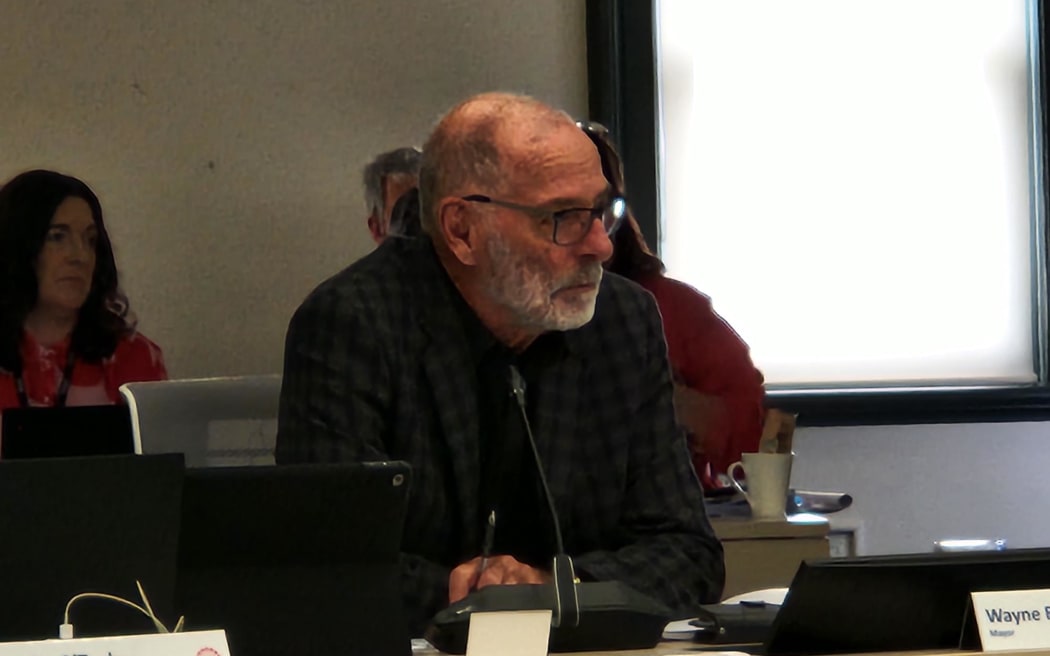Auckland mayor Wayne Brown grants two interviews, of 108 media requests
Auckland mayor Wayne Brown grants two interviews, of 108 media requests

Wayne Brown granted two one-on-one interviews with journalists during his first month in office as mayor. Photo: RNZ / Finn Blackwell
Auckland mayor Wayne Brown gave two direct interviews to journalists in his first month in office, of the 108 requests made by media.
Brown won the mayoralty vote in a landslide on 8 October last year, soundly defeating his nearest rival Efeso Collins.
His victory was on the back of a campaign promising to "fix Auckland", and by promoting himself as a businessman, not a politician.
It is that last point which is being used by his team to justify a lack of public engagement since he took over from the former mayor, Phil Goff.
Wayne Brown was not good in front of a microphone, but he was good in the boardroom, RNZ has been told.
According to figures obtained under the Local Government Official Information and Meetings Act, Brown received 108 media requests from radio, television, print and online outlets between 12 October and 12 November.
RNZ had asked for figures from Brown's election date of 8 October, but data provided did not include the first three days of his mayoralty, when he fielded a huge volume of requests for interviews and comment after his victory.
Of the 108 requests listed by the Auckland Council, 54 requests for an interview were declined. Information, statements or responses were provided for the other 54.
Brown did grant two one-on-one interview requests - one to Newstalk ZB's Mike Hosking, and another to 1News' Katie Bradford.
In the response - signed off by Sarah Parry-Crooke, the senior privacy and official information business partner at Auckland Council - it noted it was a "period of transition for the Mayoral Office, with the mayor and his interim team focussing on getting to know the large and complex organisation that is Auckland Council".
"This coincided with setting up all of the new and necessary processes of a new Mayoral Office and staffing its teams. To help out during this time of transition, the council's communications team provided some assistance, including helping to coordinate media inquiries and requests."
In addition to the two one-on-one interviews Brown granted, two media conferences were held at the mayor's office on 27 and 31 October, and a media stand-up was held on 10 November, following the governing body meeting held at Auckland Town Hall.
The response notes the three all-in interviews involved several reporters and multi-media journalists, "and the mayor took questions and/or spoke to reporters".
New Zealand Herald senior journalist Simon Wilson told Morning Report it simply was not good enough.
"It matters because there are questions to ask him about how the city is being run, what he's doing.
"He's rolled out a whole lot of new initiatives, he's running the city in a different way from what was done in the past, and just getting the official version of it isn't really good enough."
Wilson said Brown had two modes of talking to people, one being an off-the-record chat and the other, that he was good at telling people what to do.
Talking to the media did not fit into either of those, he said.
Wilson said Brown simply was "not good at talking to media" and believed a decision had been made that doing so risked him "looking less than he would like to".
An important role of a mayor was being able to speak to media and the public during a crisis, Wilson said.
The more experienced Brown became in talking to the media where there was not a crisis, the better, because a crisis would come, he said.
Wayne Brown declined an RNZ request for an interview.
But a spokesperson for the mayor's office reiterated that his focus following his election was on the council's performance and financial position, citing an annual budget deficit of $295 million.
"The mayor's 'first 100 days in office' were critical, and required a certain single-mindedness in developing a mayoral proposal to bridge this financial shortfall and bring together a team of 21-plus in a matter of weeks, rather than being readily available for one-on-one media interviews.
"The mayoral office was highly proactive and reactive to media."



Comments
Post a Comment